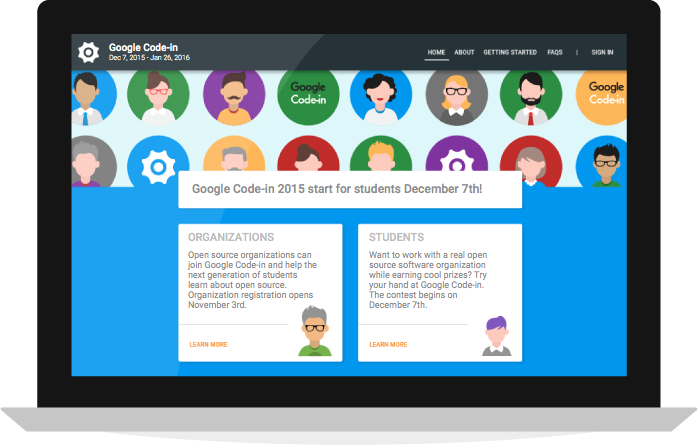A global, online open source development & outreach contest for preÂ-college students ages 13-Â17

The Google Code-Âin contest gives students around the world an opportunity to explore the world of open source development. Google not only runs open source software throughout our business, we value the way the open source model encourages people to work together on shared goals over the internet.
Give it a try from December 7th, 2015 to January 25th, 2016!
Participants complete “tasks†of their choice for a variety of open source software projects. Students can earn t-Âshirts, certificates, and hooded sweatshirts for their work. Each software project will name two students as their grand prize winners and those students win a four day trip to in Mountain View, CA, USA in June 2016.

Since open source development is much more than just computer programming, there are lots of different kinds of tasks to choose from, broken out into five major categories:
1. Code: Writing or refactoring code
2. Documentation/Training: Creating and editing documentation and helping others learn
3. Outreach/Research: Community management and outreach/marketing, or studying problems and recommending solutions
4. Quality Assurance: Testing to ensure code is of high quality
5. User interface: User experience research or user interface design
This year students can work with 14 open source organizations: Apertium, Copyleft Games Group, Drupal, FOSSASIA, Haiku, KDE, MetaBrainz, OpenMRS, RTEMS, SCoRe, Sugar Labs, Systers, Ubuntu, and Wikimedia Foundation.
Over the past five years, over 2200 students from 87 countries completed at least one task in the contest. This year we hope to have even more students participate globally. Please help us spread the word and bring more students into the open source family!
Visit g.co/codein to learn more about the contest. For even more information and contest updates, read our Frequently Asked Questions, follow our blog or join our mailing list.
The Google Code-Âin contest starts on December 7, 2015!




